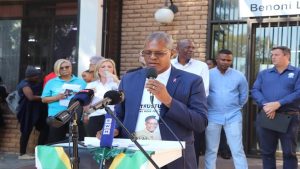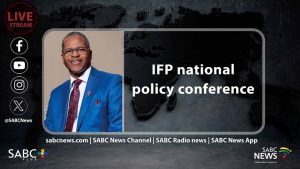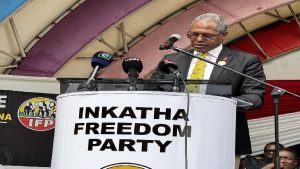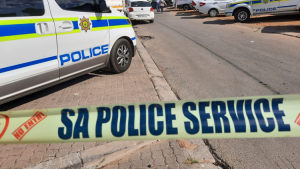The Inkatha Freedom Party (IFP) launches its 2024 election manifesto this Sunday at the Moses Mabhida Stadium, KwaZulu-Natal.
Turnout on the day at the 56 000-seater stadium will provide a glimpse into the party’s strength going into the May 29 general election.
For the IFP, KwaZulu-Natal is home turf. Comparisons, therefore, are bound to be made with the African National Congress (ANC) and Economic Freedom Fighters (EFF), who both enjoyed near-maximum capacity showings when they launched their manifestoes here in February.
Also, this will be the IFP’s first election without founding president, Prince Mangosuthu Buthelezi who died last September, aged 95. The party’s showing in this election, thus, will provide more insight into its future electoral fortunes.
From ‘cultural movement’ to political party
‘Inkatha’ was founded on 21 March 1975 at KwaZimela and was popularly known as Inkatha yeNkululeko yeSizwe, a ‘national cultural liberation movement’ (Kgare ya Tokoloho ya Setjhaba).
Following the unbanning of political parties such as the African National Congress (ANC), South African Communist Party (SACP) and Pan Africanist Congress (PAC) in 1990, ‘Inkatha’ was re-launched and rebranded as the Inkatha Freedom Party (IFP) on 14 July 1990. For the first time in its history, the entity also welcomed non-Zulu supporters into its fold.
At the time of its launch, the IFP listed ‘four great tasks’. These were:
- Establish an open, free, non-racial, equal opportunity and reconciled society with democratic safeguards
- Fight ‘the real enemies of the people’, such as poverty and hunger
- Redistribute the country’s wealth ‘to the benefit of all’
- Ensure the maintenance of a stable, peaceful society
A week after the announcement, the party employed the services of world-renowned marketing expert, David Kingsley, to assist the IFP transition from its cultural roots to a fully-blown political party to win votes.
Since its founding, Inkatha (the IFP) has known only two leaders, namely Prince Mangosuthu Buthelezi who served as president from 1975 until 2019; and Velenkosi Hlabisa, the IFP’s current leader who replaced Buthelezi five years ago.
Ideologically, the IFP considers itself a conservative, liberal-democratic party that advocates for pro-capitalist and free market principles.
IFP loyalty is mainly rural-based; and emanates from two provinces, namely KwaZulu-Natal (90%) and Gauteng (9%).
Tracking the IFP’s electoral trajectory
Despite the IFP electing to contest the landmark 1994 general election seven days before the poll, the party drew more than two million votes nationally. And this result was without the luxury of campaigning using posters, billboards and other means of vote-canvassing like other parties did.
The IFP’s two million haul gave it approximately 11% of the national vote, translating into 43 seats in the National Assembly.
It also won political control of KwaZulu-Natal in the 1994 election with 1.8 million votes.
This electoral dominance would continue until 2004.
| IFP GENERAL ELECTION OUTCOMES 1994 – 2019 | ||||||
| 1994 | 1999 | 2004 | 2009 | 2014 | 2019 | |
| VOTES | 2 058 294 | 1 371 477 | 1 088 664 | 857 395 | 441 854 | 599 839 |
| % | 10.54 | 8.58 | 6.97 | 4.55 | 2.4 | 3.38 |
| SEATS | 43 | 34 | 28 | 18 | 10 | 14 |
| Sourced from www.elections.org.za results dashboard | ||||||
Since its strong showing in the 1994 election, the IFP, however, has been on a consistent downslide.
Between 1994 and 2014, the IFP lost a cumulative 1 616 440 votes.
However, to date, the IFP’s largest vote loss in a single poll nationally came in 1999 when it shed 686 817 votes.
The party went on to lose a further 415 541 votes between the 2009 and the 2014 elections.
Of course, many reasons were given for the party’s consistent weakness between elections, chief of which was the arrival of ANC president, Jacob Zuma before the 2009 poll.
For example, between the 2004 and 2009 polls, the ANC received an additional +769 833 national votes, a 7-percentage point increase. But when it came to the KwaZulu-Natal provincial ballot, the ANC witnessed a 41-percentage point rise, winning +904 693 more votes than 2004. The IFP, on the other hand, saw its vote-share decrease by approximately 240 000 votes on the national ballot (33-percentage point decline) and by 229 240 votes on the provincial ballot (29-percentage point decrease).
While the ‘Zuma factor’ had an effect on the ANC’s vote tally in 2009, the IFP’s subdued losses do not fully explain where the remaining votes came from.
| ANC/ IFP INTERPLAY NATIONAL (N) & PROVINCIAL (P) BALLOT 2004 – 2019 | |||||||||
| 2004 | 2009 | 2014 | 2019 | ||||||
| PARTY | N | KZN P | N | KZN P | N | KZN P | N | KZN P | |
| ANC | 10 880 915 | 1 287 823 | 11 650 748 | 2 192 516 | 11 436 921 | 2 475 041 | 10 026 475 | 1 951 027 | |
| IFP | 964 101 | 1 009 267 | 723 940 | 780 027 | 393 949 | 416 496 | 532 563 | 588 046 | |
| Sourced from www.elections.org.za results dashboard | |||||||||
A new threat…from within
Compounding the IFP’s electoral dilemma in the 2014 general election was breakaway party, the National Freedom Party (NFP), led by former IFP chairperson Zanele kaMagwaza-Msibi.
On the national ballot, the NFP took away 288 742 votes away from the IFP and six seats (1.57%) in the National Assembly.
When it came to the KwaZulu-Natal provincial ballot, the NFP’s haul was a respectable +280 425 votes, translating to just over seven-percent of the vote and six seats.
Embarrassingly, the IFP lost its official opposition status to the DA.
This was the IFP’s worst electoral showing since 1994.
But this new threat from within its own ranks did not begin in 2014. The NFP assault started when the breakaway party formed in 2011, just in time for the municipal elections that year.
In the 2011 local government election, kaMagwaza’s party snatched away 822,990 votes (ward, PR & DC) from the IFP, equating to 11.21% and 227 seats. In Nongoma, the NFP won 19 of the 42 council seats (44.31%); and in other areas such as eDumbe [Paulpietersburg], the party won 8 of the 15 available seats (51.91%). In Zululand, the NFP won 31.82 % of the vote, giving it 4 of the 14 seats in council. Thankfully, for the IFP, the NFP’s troubles gave it a breather in 2016 when party officials neglected to submit the necessary election-related documentation to the Electoral Commission, effectively shutting out the NFP from a number of municipalities. In the 2016 poll, the NFP ended up with only two seats.
The party’s only vote-share increase came in the 2019 general election. This in part was due to Zuma’s removal from the presidency; and the near-collapse of the NFP.
The KwaZulu-Natal battleground has altered for the 2024 poll
Going into the 2024 national and provincial elections, there are five key players in the KwaZulu-Natal electoral space, namely the ANC, IFP, DA, EFF and the NFP. Zuma’s Umkhonto we Sizwe (MK) party is another entrant that is giving the ANC and other parties endless headaches since its December 16, 2023 launch.
In two recent by-elections, MK managed to split the vote in Abaqulusi and uPhongolo, giving the IFP easy wins in wards 8 and 2 respectively. A similar scenario transpired in its first by-election outside of KwaZulu-Natal when it again managed to split support for the ANC in Mpumalanga.
MK’s objective it seems is not so much to wholesale unseat the ANC but to split the vote, bring the ANC below an electoral majority; and thereby force its kingmaker status on whichever party wins the most votes.
For opposition parties like the IFP, DA and EFF, MK is a useful ally in that sense. If the ANC is weak, other parties can capitalize.
The IFP needs to use this weapon to its advantage, especially in a province where it has majority support.
Between now and the May 29 poll, parties like the IFP need to fully exploit this chink in the ANC’s electoral armour by appealing to the 5.7-million registered voters of KwaZulu-Natal.
| KWAZULU-NATAL PROVINCIAL LEGISLATURE VOTES 2014 – 2019 | ||||||||
| 2014 | 2019 | 2014 – 2019 | ||||||
| PARTY | VOTES | % | SEATS | VOTES | % | SEATS | VOTES | SEATS |
| ANC | 2 475 041 | 64.52 | 52 | 1 951 027 | 54.22 | 44 | (524 014) | (8) |
| (27-percentage point decline in number of votes between 2014 & 2019) | ||||||||
| IFP | 416 496 | 10.86 | 9 | 588 046 | 16.34 | 13 | +171 550 | +4 |
| +29-percentage point increase in number of votes between 2014 & 2019 | ||||||||
| DA | 489 430 | 12.76 | 10 | 500 051 | 13.90 | 11 | +10 621 | +1 |
| +2.12-percentage point increase in number of votes between 2014 & 2019 | ||||||||
| EFF | 70 823 | 1.85 | 2 | 346 361 | 9.71 | 8 | +275 538 | +6 |
| +80-percentage point increase in number of votes between 2014 & 2019 | ||||||||
| NFP | 280 425 | 7.31 | 6 | 56 587 | 1.57 | 1 | (223 838) | (5) |
| (396-percentage point decline in number of votes between 2014 & 2019) | ||||||||
| Information sourced from www.elections.org.za results dashboard | ||||||||
What the IFP needs to do in the May 29, 2024 general election?
Over successive elections, the IFP has repeatedly demonstrated that it is a party with a loyal support base. That support base will more than likely afford the IFP another five years nationally and provincially.
But for a political party to truly embrace the changing electoral landscape, it needs to adapt for it to win votes.
Sadly, in the case of the IFP, the party has shown on numerous times that it is very much stuck in a time warp of doing things.
Even its posters advertising this manifesto launch looks hurriedly put together. If one travels on the M4 freeway, hundreds of these posters lining the road to the central business district will confront one. But what do they say? I have no idea. Why? Because the text on these posters are too small for any passing motorist to even attempt reading – even with my glasses on.
Methods of election campaigning have changed with the times. While I agree that traditional media interviews and appearances, door-to-door visits and stadium rallies are still part-and-parcel of South African voter outreach programs, social media has to comprise an integral element of any campaign in this day and age of modern technology.
Mobile phones are the new election billboards of our times. If you are serious about coveting the attention of the ‘younger’ voter, old ways of appealing to voters has to be re-looked at.
Election campaigns are costly exercises. And now every political party has the resources to mount elaborate campaigns across the length and breadth of the country. This is where ‘free media’/ ‘free political marketing’ comes in via social media platforms.
The IFP is in the fortunate space of governing a good number of places in KwaZulu-Natal. Yet, why is it that we see none of these successes being trumpeted like we see with the DA? This is a huge missed opportunity to toot your own horn.
Regardless, the late Prince Mangosuthu Buthelezi – as in previous elections – will persist to be the IFP’s strongest drawcard in the 2024 general elections. This is why his face is still emblazoned on all party communications. Current party leader, Velenkosi Hlabisa seems like a nice guy. But he lacks the gravitas and charisma that Buthelezi brought to the IFP brand.
My take: the IFP will make modest increases in the 2024 general elections, including a small increase in their national vote tally. Here, in KwaZulu-Natal, the party will benefit from the ANC vote-split and the NFP’s further weakening. A resurgent EFF, too, will harm its electoral chances like it did in 2014 and 2019. However, if I was a betting man, I will not be expecting ‘fireworks’ from the anachronistic Inkatha Freedom Party in these elections.
Dr. Ronesh Dhawraj is SABC News Research Editor






